Jennifer Flanders's Blog, page 35
March 13, 2013
25 Ways to Raise Capable, Confident Children
 The fourth of our twelve children will be leaving the nest in another couple of months, and it has my husband and me reexamining the job we have done (thus far) raising our children.
The fourth of our twelve children will be leaving the nest in another couple of months, and it has my husband and me reexamining the job we have done (thus far) raising our children.
Of course, we’ve made lots of mistakes (that’s another post for another day), but by the abundant grace of God (and by following the great example that our own parents modeled for us), there are many things we’ve done right — things we want to make sure we continue to do as we train up the remaining eight children still under our care.
And so I offer you “25 Ways to Raise Capable, Confident Children.” These are in no particular order, beyond the first, which should be our starting point in every endeavor:
Pray without Ceasing:
Parenting is one of the most demanding (and most rewarding) jobs any of us will ever do. As such, it requires an extra measure of wisdom from above, as well as strength, endurance, and consistency. Pray for yourself, but pray also for and with your children. The best parenting practices in the world will fall flat apart from God’s blessing. Pray that He will soften your children’s heart, that He’ll give them a teachable spirit, that He’ll begin this work early, and that He’ll be faithful to complete it, as He promises in His word. (Philippians 1:6, 1 Thessalonians 5:17)
Clearly Define the Rules:
Make sure your children know what you expect of them, then oblige them to obey cheerfully and completely. Well-established and consistently-enforced boundaries are both a protection and a comfort. Do not allow children to disregard the rules without consequence, or to speak to parents (or anyone else) in a disrespectful manner. Bad behavior should be penalized and good behavior should be rewarded. (Ephesians 6:1)
Teach Them to Listen:
Everything in life comes more easily to a child who knows how to pay attention. Fortunately, listening is a skill which can be practiced from infancy — train your baby to track your voice as you call his name from one side then the other, play “Simon Says” with your toddler, insist that your energetic grade-schooler stand still and make eye contact when you are giving him instructions, call your teen by name and use a key phrase (such as, “Listen to my words…”) to communicate the fact that what you are about to say is important and should be taken to heart. (Proverbs 4:1)
Bid Them Be Happy:
Cultivate contentment in your children, and you will all live happily ever after. No whining allowed! If you make certain your child’s whining is never rewarded, he will cease to do it. Conversely, when you give in to whining, you reward and reinforce the very behavior that drives most of us crazy and thereby encourage your kids to whine all the more. Of course, it should go without saying that we need to maintain a happy, positive attitude ourselves. The irony of an enraged parent screaming at a child, “Why can’t you just be happy?” is not lost, even on very small children.(Philippians 2:14)
Nurture Your Marriage:
One of the most important things a father can do for his children is to love their mother, and vice versa. If you are married, do all that you can to invest in and safeguard that relationship. Let your children know that you are 100% committed to making sure your marriage lasts. Kids who are given cause to doubt that fact spend a lot of emotional and psychological energy worrying that their parents may divorce (then feeling somehow responsible when they do). This can completely undermine a child’s sense of stability and security and will often sidetrack the normal development of confidence and competency in multiple areas. (Mark 10:7-9)
Show Them You Care:
Dr. Anthony Witham once said, “Children spell love T-I-M-E,” and it is true. Spend time with your kids, individually (use errands as an opportunity for one-on-one time) and as a group. Get excited about the things that excite or fascinate them. Take delight in their company, and let them see that delight in you eyes and your smile and your manner. Children need quality and quantity time, so give them plenty of both. There is no substitute for your intentional, fully-invested presence in the life of your child. (Isaiah 49:15)
Put Them to Work:
Assign household chores. Give them real and increasing responsibility from as young an age as possible. Kids who do chores grow up to be more successful than those who don’t. One of the most important lessons you can teach your child is to work hard and to take pleasure in a job well done. (Colossians 3:23)
Enjoy Them at Play:
Regularly enter into your child’s world of play. Take pleasure in relaxing with your children, especially after they’ve spent time working alongside you. Get up a rousing game of catch or tag or Spoons or Scrabble. Shoot hoops in the driveway or toss a frisbee at the park. Work a puzzle together. Teach your child how to play chess or bridge or dominoes. (Ecclesiastes 3:1)
Encourage Them to Try New Things:
Expose your children to as broad a range of experience as you are able: music, sports, travel, missions, charity, social and cultural events, etc. This will furnish them with a more well-rounded view of the world and will hopefully make it easier for them to find their place in it. Give them the freedom and the tools to pursue the things that pique their interest. Let them know that by God’s grace, they can do anything they set their minds to. (Philippians 4:13)
Point Them to Scripture:
Let the Word of God permeate, influence, and inform every facet of family life. Read the Word of God to your children. Teach it to them diligently. Memorize it as a family. This is something that comes especially easy to children, so take advantage of that fact! Hide God’s Word in your heart. (Deuteronomy 11:18-21, Psalm 119:11)
Protect Them from Harm:
Vigilantly guard your kids against harmful influences, as well as physical threats. This is fairly easy when they are little, while you still enjoy complete control over their schedules, you pick all their friends for them, and they have not yet discovered a way around those child-proof locks (a skill some kids acquire at an exasperatingly young age). This task becomes more challenging, though no less important, as children grow older and begin to make most choices themselves. Even then, parents should be aware of the company their children keep, the movies they watch, the music they listen to, and the websites they frequent — not for the purpose of micro-managing or being legalistic (that plan will backfire, for sure), but in order to discuss freely and frankly any potential hazards of which parents are aware. (Ezekiel 33:6, Proverbs 4:14-15)
Help Them Stay Healthy:
Work to establish good habits in the areas of diet, sleep, exercise, and hygiene. Feed your children square meals, and if you want to nourish their souls as well as their bodies, preserve the family dinner hour. Use it as an opportunity to discuss and dissect the day’s events, both within your family circle and in the world at large. Teens whose families eat dinner together at least five times per week are far less likely to abuse drugs or alcohol or engage in other risky behavior. They also tend to eat more fruit and vegetables then children in families who do not consistently dine together.
Give Them Good Manners:
Common courtesy and respect are no longer as common as they ought to be. Teach your children to say “please,” “thank you,” “excuse me,” “you’re welcome,” “yes, ma’m,” and “no, sir.” Well-behaved kids are such a novelty these days. Good manners make a young person stand out in a crowd in a more memorable way than the wildest tattoo or body piercing can ever do. (1 Timothy 4:12)
Read Them Great Books:
Read well-written and beautifully illustrated picture books aloud to your children when they are little, yes, but continue to read engaging novels, inspiring biographies, and thought-provoking non-fiction aloud, even after they grow too big for your lap. Children are never too old to be read to, so choose well and discuss at length. Sharing books together this way is the surest way to foster in your kids a lifetime love for reading, which itself opens whole new worlds of knowledge and experience to them. Thanks to public libraries, this is a practice even the poorest of families can afford.
Equip Them to Lead:
Stress the importance of integrity, humility, self-discipline, and willingness to stand alone. Model servant-leadership, and challenge them to follow Christ’s example, who came not to be served, but to serve. Encourage them to take initiative and do things that need to be done without being asked. (Mark 10:45, Philippians 2:3-8)
Treat Them with Understanding:
Kids are people, too! Be patient with your children and treat them with kindness. Do not be unnecessarily harsh with them, and be quick to forgive when they repent of wrongdoing. Be sympathetic. Try to remember what it was like to be in their shoes.(Ephesians 6:4, Ephesians 4:32)
Turn Off the TV:
Set reasonable limits on screen time of any sort, including but not limited to television, computers, smart phones, tablets, and video games. It would probably be both unrealistic and impractical to attempt to eliminate all electronic media usage from our homes, but any child who spends 53 hours a week staring at a screen could probably find something more productive to do with much of that time. (Psalm 90:12)
Inspire Good Sportsmanship:
Teach them to lose with grace and to win with humility, conscious that their natural talents and abilities are gifts from above. Stress the importance of always playing fairly and if you must err, err in favor of your opponent. Better to lose the game than to be thought a cheater. (Philippians 2:15)
Lead Them by Example:
Model for your children the character and behavior you wish them to exhibit, but do not pretend to be perfect (or expect your children to be). Be honest about personal flaws and quick to admit mistakes, apologizing and asking your children’s forgiveness when you wrong them. (1 John 1:8-10)
Train Them to Think:
Education is more than regurgitating facts; our kids must also learn to reason and to think through things on their own. We can ask questions of them to help the process along (Socratic method), but we must not shy away from their asking questions of us, as well. Anticipate, encourage, and answer their inquiries in a way that is intellectually honest, morally upright, scientifically accurate, and neither defensive nor overly-dramatic. And for those questions for which we have no good answer? Admit you don’t know, then pray about the matter and search for a solution together. (Jeremiah 33:3)
Grant Them Some Space:
Beginning with letting your two-year-old choose what she wants to wear, allow your children to make their own decisions whenever possible, and be supportive of their choices. You can offer your kids guidance and encouragement without smothering and micromanaging them. But be forewarned: Their thoughts, tastes, and values may not always line up with yours 100%, which is okay. They are individuals and are entitled to have their own hopes and dreams and opinions. Parents can reserve the right to overrule younger children whenever they deem it necessary, but as your kids grow, look for ways they can express their individuality in a manner that is acceptable to both of you. (Romans 14:5)
Bless Your Children:
Let your sons and daughters know that you are proud of them. Don’t get so focused on correcting your children when they do wrong that you forget to praise them when they do right. Our kids never outgrow the need for approval and affirmation, so give it freely. (Genesis 27:34)
Don’t Overreact:
Whether your toddler takes a spill while learning to walk or your grade-schooler makes a C on his spelling test or your teenager makes a wrong turn while learning to drive, swallow your fears. Remember that we ALL have mishaps and we ALL make mistakes — surely this one is not the end of the world. Don’t be negligent and reckless, but don’t be hovering and over-protective either. Keep calm and carry on! Take failures in stride and don’t give in to worrying.(Philippians 4:6)
Entrust Them to God:
Instill in your children a clear vision of what they can accomplish for God’s glory. Do your best to give them an eternal perspective. Pass them the baton. Our kids are in His hands: only by His grace do any of our efforts succeed.
Let Them Grow Up:
Our ultimate goal is not to raise oversize children, but to raise mature, responsible adults. This will not happen overnight. Neither can you expect to cling tightly until the day your child turns 18 (or 21 or 30), and then let go all at once. It is a gradual process, like the letting out of kite string. Keep a firm hold on the end while they are younger, yes, but be willing to spool out the thread smoothly and steadily as needed. (Proverbs 22:6, Luke 16:10)
So that’s my list. Is there anything you would add? Leave off? What types of things have you found most helpful in raising capable, confident children?








March 10, 2013
Lesson #5: Always Tip Your Waiter Well
 What follows is the fifth (and long overdue) installment in a series I started late last summer called “7 Life Lessons I’ve Learned from my Husband.” It’s an important one, so take notes!
What follows is the fifth (and long overdue) installment in a series I started late last summer called “7 Life Lessons I’ve Learned from my Husband.” It’s an important one, so take notes!
My husband and I entered marriage with very disparate attitudes toward tipping.
I had always calculated my tips according to exact (minimum recommended) percentages, with a little extra thrown in if the service exceeded my expectations (which were admittedly high, so it rarely did). My goal was to spend as little as possible, which explains why I also ordered only water to drink and steered clear of exotic (read “expensive”) menu offerings.
My husband tips generously regardless.
I’ve even seen him leave a 25% tip at a self-service buffet for a waitress who was blatantly rude to us, took our receipt and never returned it, and didn’t refill our drink glasses a single time throughout our meal.
If you were to question him about it, he’d explain the rationale behind this practice:
Servers Depend on Good Tips -
People don’t just wait tables because they enjoy getting chewed out when the steak’s overcooked. More often than not, they are waiting tables to make ends meet. What’s more, they only get paid $2.13 an hour to do it — the rest is (theoretically) made up in tips.
Servers depend on the generosity of their customers to make a living wage. They need tips to pay the rent, to put food in their children’s mouths, or to cover their college tuition. Additionally, many waiters are required to share a fixed percentage of their tips with bussers, runners, and hosts. When a customer stiffs them, they must pay the difference out of their own pocket.
Good Service Deserves Good Tips -
Waiting tables is grueling work. Servers are on their feet all day. They must multitask continually. And they have to bust tail to keep up with all the demands, especially during busy times, like the lunch hour rush, Friday nights, and Sunday mornings. And they do it all with a smile on their face.
There are orders to be taken (while patiently waiting as 4-year-olds deliberate indecisively between chicken strips and grilled cheese), drink glasses to fill (and refill and refill), piping hot plates to serve up promptly, bread baskets (or chips and salsa bowls) to replenish, desserts to proffer, tickets to tally, to-go boxes to fetch, and change to be made.
Most servers work hard to earn their tips, so leave them a nice one.
Bad Service is Improved by Good Tips -
Servers are only human. Your waiter has bad days, just like everybody else: His car breaks down. His girlfriend dumps him. His bills come due. His last customer sends her order back to the kitchen three times before she is satisfied.
The discouragement, distraction, and/or despair that accompanies such stressers can adversely affect his job performance. Of course, you are in no way obligated to reward lousy service with a large tip, but if you choose to do so anyway — to extend grace where it is so obviously and desperately needed – you might just turn a server’s crummy day (and attitude) into a great one.
Your tip will be appreciated and remembered, guaranteeing you better service next time, should the same server be assigned to you again. But it will also give him hope, which in turn will lead him to render better service to all the customers who come after you.
It Reflects Well on You to Leave Good Tips -
Successful CEO’s know something obnoxious restaurant patrons don’t: The way you treat (or mistreat) your waitress says a lot more about you than it does about her.
This fact, commonly known as “The Waiter Rule,” is what leads savvy business owners to conduct luncheon interviews of potential hires in a restaurant setting. That a prospective employee is courteous to the person conducting the interview — the one who will determine whether or not he gets the job — says very little. That he is patient with a waitress who gets his order wrong or spills ice water in his lap speaks volumes.
More revealing still is how a person treats his server when he thinks no one is watching — including (and perhaps especially) when it comes time to sign the check.
You Share God’s Blessings When You Leave Good Tips -
It is common knowledge in the service industry that Sunday morning shifts are the absolute worst. The Sunday lunch hour is insanely busy as restaurants fill to bursting with church-going folks fresh from worship, and tips are minimal or non-existent.
This may be, as one sweet waitress conjectured, because those customers gave all their money to the church and have nothing left for leaving a nice tip, but such reasoning fails to account for why they’d be eating out in the first place, and it certainly doesn’t explain why so many of them treat the waitstaff with frequent and unjustifiable rudeness while they’re there.
“Out of the same mouth come both blessings and cursing. My brethren, these things ought not be so.” (James 3:9-10)
We who name the name of Christ should demonstrate His character in how we treat others, including our waiters and waitresses. The fruit of His Spirit — love, joy, peace, patience, kindness, goodness, faithfulness, gentleness, and self control — should be evident in our every interaction (Galatians 5:22).
Surely those of us who have been forgiven so much should be willing to overlook the offenses of others (Matthew 6:14), especially such minor mistakes as a server’s filling our glass with sweet tea rather than unsweet or forgetting that we ordered our salad dressing on the side.
And we who know personally the Creator of the universe should be able to look past a waitress’s tattoos (or body piercings or unconventional hairstyle or the fact that she is working on Sunday), and see a person created in the image of God — one who deserves to be treated with dignity and respect, especially by those of us who call ourselves Christians, and especially if we are to have any hope of sharing the love of Jesus with her in a way that rings true.
Yes, Christ’s redeeming love is the best gift anybody will ever receive, and yes, those of us who have experienced that love firsthand should share it with others at every opportunity, but if you want your server to actually read that gospel tract you’re leaving behind on the table, you should first slip between its pages the most generous tip you can muster.
So there they are in a nutshell: The reasons my husband insists that we always tip our waiter well. It’s a philosophy forged while he was waiting tables himself through high school and college.
He has always maintained that his experience waiting tables during that season of life makes him a better physician during this one. Doctors, like waiters, must be willing to get their hands dirty; they need to know how to multitask, how to interact with a variety of cultures, personalities and backgrounds, and how to deal with an oftentimes demanding and unreasonable public (whether they’re sick or they’re hungry, people want to be taken care of fast and can be downright difficult until their physical needs have been addressed and their pain or hunger alleviated).
Also in medicine, as in the food industry, one’s success or failure depends on a combination of both skill and personality. One must be both competent and courteous to do well. These lessons are best learned early in one’s career, which is why our son Samuel, who’ll be starting medical school this fall, is spending his last semester at home waiting tables (parttime, at least, when he’s not teaching biology labs at the junior college). He hopes to follow in his father’s footsteps.
And, just in case you’re wondering about my own current tipping practices, my husband has completely won me over to his way of thinking. Now, on the rare occasion that I dine out without him, I never scrimp on the tip or try to see how little I can leave without feeling guilty. Neither do I calculate a fixed 20% and leave it at that.
Instead, I think to myself, “How much would my husband tip on this tab?” Then I leave that amount, plus a little bit more — just to be safe.








March 1, 2013
Enough with the Excuses
I don’t know who said it, but it’s true:
“If it’s important to you, you’ll find a way. If it’s not, you’ll find an excuse.”
Lots of wives have become experts at making up excuses to avoid something that’s extremely important to their husband. Don’t be one of them.

Not Tonight, Dear…
I’ve got a headache.
I’m too tired.
I’m having PMS.
I couldn’t think of making love when the house is such a mess.
The baby’s sick.
Your mother called.
I’ve got too much to do.
I think I’d rather cuddle — is that alright with you?
It’s freezing cold.
My back is sore.
I need to wash my hair.
The children have a soccer game, and I’ve no time to spare.
I’ve got to shop –
Our pantry’s bare.
The kids are still awake.
Besides, we had sex yesterday — tonight, I need a break.
Excuses, excuses! Some are valid, some are lame.
In the end, it matters not – the result is still the same.
We’d find a way, if sex were at the top of our to-do’s,
But since it’s not, we wrack our brains to dream up some excuse!
The toilet’s clogged.
It’s hot and muggy.
I’ll be late for work.
Forget it! I’m still mad at you — you know you’ve been a jerk.
My legs need shaving.
I feel fat.
I’m under too much stress.
We’ve barely finished dinner, Dear, let’s let our food digest.
You must be kidding.
I’m upset.
Just wait for Friday night.
The bills are due. We need a budget. Money’s getting tight.
I’ll miss my show.
Go take a shower.
Please don’t think me rude:
Sweetheart, it’s nothing personal — I’m just not in the mood!
Excuses, Excuses, to keep your man at bay—
The devil will supply them if you can’t think what to say.
When wives won’t give their husbands sex, then everybody loses,
But Heaven’s floodgates open when we stop making excuses!









Enough with the Excuses
I don’t know who said it, but it’s true:
“If it’s important to you, you’ll find a way. If it’s not, you’ll find an excuse.”
Lots of wives have become experts at making up excuses to avoid something that’s extremely important to their husband. Don’t be one of them.

Not Tonight, Dear…
I’ve got a headache.
I’m too tired.
I’m having PMS.
I couldn’t think of making love when the house is such a mess.
The baby’s sick.
Your mother called.
I’ve got too much to do.
I think I’d rather cuddle — is that alright with you?
It’s freezing cold.
My back is sore.
I need to wash my hair.
The children have a soccer game, and I’ve no time to spare.
I’ve got to shop –
Our pantry’s bare.
The kids are still awake.
Besides, we had sex yesterday — tonight, I need a break.
Excuses, excuses! Some are valid, some are lame.
In the end, it matters not – the result is still the same.
We’d find a way, if sex were at the top of our to-do’s,
But since it’s not, we wrack our brains to dream up some excuse!
The toilet’s clogged.
It’s hot and muggy.
I’ll be late for work.
Forget it! I’m still mad at you — you know you’ve been a jerk.
My legs need shaving.
I feel fat.
I’m under too much stress.
We’ve barely finished dinner, Dear, let’s let our food digest.
You must be kidding.
I’m upset.
Just wait for Friday night.
The bills are due. We need a budget. Money’s getting tight.
I’ll miss my show.
Go take a shower.
Please don’t think me rude:
Sweetheart, it’s nothing personal — I’m just not in the mood!
Excuses, Excuses, to keep your man at bay—
The devil will supply them if you can’t think what to say.
When wives won’t give their husbands sex, then everybody loses,
But Heaven’s floodgates open when we stop making excuses!









February 28, 2013
The #1 Rule for Building a Happy Marriage

Jesus spelled out our standard in the Sermon on the Mount: “Do unto others as you would have them do unto you.” (Luke 6:31)
Confucius taught a similar principle: “Never impose on others what you would not choose for yourself.”
As did Buddha: “What is hateful to you, don’t do to others; what is delightful to you, do for others, too.”
And Muhammad: “Seek for mankind that of which you are desirous for yourself.”
In fact, every major religion promotes some version of The Golden Rule.
In marriage it boils down to this:
“Treat your spouse the way you wish to be treated.”
Would you like for your husband to be patient and understanding? Then extend an extra measure of patience and understanding towards him. (Ephesians 4:2)
Do you want him to honor you as a respected colleague? Then be faithful and deliberate in the way you communicate respect to him. (1 Peter 2:17)
Do you hope he’ll be quick to forgive and forget when you’ve done something to offend him? Then don’t harbor grudges against him. Give no place to bitterness or resentment in your heart. (Ephesians 4:32)
Would you like for him to show appreciation for the many things you do to make his life more pleasant? Then always make a point to say thank you to him. Cultivate an attitude of gratitude, and don’t take your man for granted. (1 Thessalonians 5:18)
Do you prefer kind, encouraging words over angry tirades? Then remain positive and upbeat yourself and resist the urge to nag or quarrel. (Proverbs 15:1)
Do you want him to prioritize things that are important to you? Then don’t make excuses to avoid what’s important to him. (Philippians 2:3-4)
Would you like for him to take notice of you and compliment your appearance? Then show him the same courtesy. Admire him and praise his manliness. Your husband wants to know that you still find him attractive. (Song of Solomon 1:16)
So that’s the key: Treat your spouse as you wish to be treated if you want a built-to-last, happily-ever-after sort of marriage.
The Golden Rule is a great principle to live by. How will you put it into practice, starting today?








February 15, 2013
In Praise of the Manly Man
 My husband and I had a lovely Valentine’s Day yesterday. He brought me roses and a huge box of chocolates, then took me out for dinner and a movie.
My husband and I had a lovely Valentine’s Day yesterday. He brought me roses and a huge box of chocolates, then took me out for dinner and a movie.
I wrote him a poem.
It’s not the first poem I’ve given him for Valentine’s Day, and it probably won’t be the last.
Although I wrote it specifically for my husband, it is really a tribute to all men like him — men who are not afraid to BE MEN in an age when masculinity is sometimes frowned upon.
So keep up the good work, guys! The world wouldn’t be the same without you!
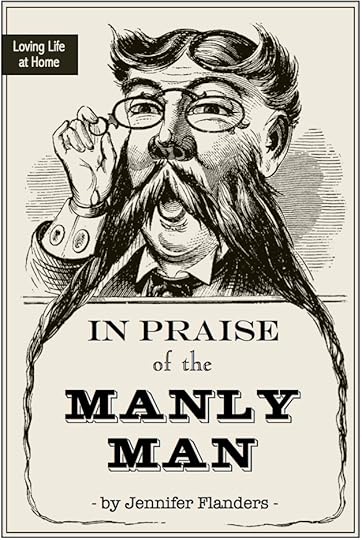
In Praise of the Manly Man
Hip! Hooray for the manly man!
He is tall, dark, and handsome, and tan.
Though he’s covered in hair,
Like a big teddy bear,
He’s a softy inside,
Where his feelings reside
For the joy of his life –
His dear children and wife –
Whom he loves just as much as he can.
He can.
Yes, he loves them as much as he can.
Three cheers for the masculine male.
Yes, he cares for his family well,
A-sweatin’ all day
As he labors away,
Comes home when he’s able,
Puts food on the table:
Potatoes and meat –
That’s what he’ll want to eat,
Just as soon as he’s looked through the mail,
The mail,
He will dine when he’s done with the mail.
Give it up for the gentlemen’s gent!
Whether living in mansion or tent,
His home is his castle
And packed with a passel
Of children who love him
And think highly of him,
And brag that their dad
Is the best to be had.
(They’d go on, but their breath is all spent –
All spent –
They’d say more, but their breath is all spent).
All hail to the heart-throbbing hunk!
He has oodles of vigor and spunk!
He’s brave. He’s courageous.
His laugh is contagious.
He brings his wife candy;
With tools he is handy:
Have burgers? He’ll grill ‘em.
See spiders? He’ll kill ‘em.
Flat tire? The spare’s in his trunk.
His trunk.
He’ll exchange it for one in his trunk.
Bravo for the noblest knight.
In his armor, so shining and bright,
He is savvy and smart,
And he has a big heart.
He provides and protects
And he likes to have sex
With his wife who adores him
And never ignores him.
‘Tis perfectly fitting and right.
So right.
To ignore him just wouldn’t be right.
Hurrah for the hale husbandman –
A sublime and superb specimen.
His wife knows her place
And she fills it with grace,
Her heart full of pride
As she labors beside
This burly, this brawny
(His muscles aren’t scrawny),
This strong, strapping stud of a man.
A man,
This amazing, magnanimous man.
He’s a man among men,
So let’s hear it again,
For this jovial jock
Of superior stock!
This gallant galoot
With his size-13 boot.
My captain. My chief.
My heart-stealing thief.
How blest to be wedded
And faithfully bedded
By so great a talent,
So virile, so valiant!
He’s stable and steady.
He’s rugged! He’s ready!
Robust and red-blooded!
My heart’s simply flooded
With love for this marvelous man.
This man.
This magnificent, masculine man!
- Jennifer Flanders
February 14, 2013








February 14, 2013
Happy Valentine’s Day
Romancing and roses aside, this is the love we must build our marriage on if we want it to last: the perfect, self-sacrificing, putting-the-needs-of-another-ahead-of-my-own, 1 Corinthians 13 sort of love that Jesus shows us. Let’s make it our goal to demonstrate that kind of love to our families — not just on Valentine’s Day, but every day of the year.

For a free printable copy of the above graphic, visit our family website. And remember: “We love, because He first loved us.” (1 John 4:19)








February 10, 2013
5 Must-Read Books for Women Who Think
 One of my readers recently criticized me for promoting what she considers oppressive and archaic beliefs regarding marriage and motherhood.
One of my readers recently criticized me for promoting what she considers oppressive and archaic beliefs regarding marriage and motherhood.
“Read something – anything
– on feminism,” she pleaded. “Learn to respect yourself, then you can respect others.”
Of course, this is a cleaned-up version of what she actually wrote. Her original comment was so riddled with expletives and venomous slurs that it made me wonder what, exactly, her notion of “respecting others” entailed.
But that is beside the point.
As it happens, I had already read half a dozen books on feminism, but her suggestion sent me searching Amazon for new titles of interest. That’s where I found the book I just finished reading: The Flipside of Feminism, by Suzanne Venker and Phyllis Schlafly.
This book — like the other four listed alongside it — is too good not to share. The authors examine feminism in light of common sense and expose it for the failed social experiment it is.
No intellectually honest person can look at the aftermath of the sexual revolution — rampant venereal disease and abortion, escalating rates of single motherhood and the abject poverty that it fosters, and coin-toss marriage survival rates — and not recognize that something is amiss.
That something is our godless worldview, of which feminism is a major component.
In my mind, buying into feminism is a lot like smoking cigarettes. While I understand why someone who has smoked two packs a day for the past 50 years might have a hard time kicking the habit, I am dumbfounded that anyone not already addicted to nicotine would ever take their first drag in this day and age, knowing what we now know about tobacco’s causal link to lung cancer, emphysema, heart disease, and a host of other devastating illnesses.
In the same way, I find it incredulous that anybody who has witnessed firsthand the destruction and despair that follow in the wake of feminism would continue to cling to such a bankrupt ideology.
Yet cling they do, and with dogged persistence.
If these women could leave off chanting their antiquated rhetoric long enough, they would hear the cries and whimpers of the modern class of victims their manifesto has created — victims that include their own children, everyone on the planet with a Y-chromosome, and ultimately the feminists themselves.
To be sure, some espouse feminist ideals because they patently believe in them, but I suspect much of our society cooperates solely for the sake of remaining politically correct. They can see as well as the next person the mess this radical movement has made of things, yet they keep their thoughts to themselves and watch on in silence.
But perhaps that is about to change.
The whispers are beginning to circulate, and the crowd is starting to stir. The status quo has been boldly challenged by books such as these — books that say what we already know in our hearts to be true: “Feminism is a bust. The emperor has no clothes.”
For a fresh look at feminism, don’t miss these five favorites:
 THE FLIPSIDE OF FEMINISM:
THE FLIPSIDE OF FEMINISM:
What Conservative Women Know — and Men Can’t Say
by Suzanne Venker and Phyllis Schlafly
Excerpt: “Most important, we must begin by telling… the truth about what feminism has done. After all, no society can thrive — or survive — when half its members believe they’re oppressed and the other half are told there’s no reason for them to exist…. It’s time to end the war between the sexes. Men are not the enemy…. Americans aren’t used to hearing [but deserve to know] that women are the fortunate sex, or that ‘hooking up’ is wrong (and foolish), or that happy lifetime marriages are attainable, or that staying home to care for one’s children is a noble and worthwhile endeavor, or that men in America are the real second-class citizens.”
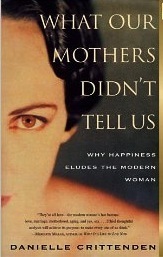 WHAT OUR MOTHERS DIDN’T TELL US:
WHAT OUR MOTHERS DIDN’T TELL US:
Why Happiness Eludes the Modern Woman
By Danielle Crittenden
Excerpt: “It may be true that 30 years ago shockingly discriminatory attitudes towards women in the workplace prevailed, and we are all thankful to be rid of them. But in their place have risen some shockingly discriminatory attitudes towards women who wish to have children without neglecting them (as exemplified by Hillary Clinton’s remark, ‘I suppose I could’ve stayed home and baked cookies’). And it is these attitudes that have made it difficult for a woman today to occupy either sphere of work or home completely happily, without feeling guilty and exhausted in one or insecure and underappreciated in the other.”
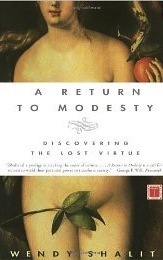 A RETURN TO MODESTY:
A RETURN TO MODESTY:
Discovering the Lost Virtue
by Wendy Shalit
Excerpt: “Modesty acknowledged [a woman's] special vulnerability, and protected it. It made women equal to men as women. Encouraged to act immodestly, a woman exposes her vulnerability and she then becomes, in fact, the weaker sex. A woman can argue that she is exactly the same as a man, she may deny having any special vulnerability, and act accordingly, but I cannot help noticing that she usually ends up exhibiting her feminine nature anyway, only this time in victimhood, not in strength.”
Note: Shalit’s follow-up book, Girls Gone Mild , is also a very enlightening read.
, is also a very enlightening read.
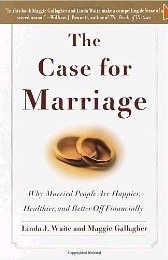 THE CASE FOR MARRIAGE:
THE CASE FOR MARRIAGE:
Why Married People Are Happier, Healthier, and Better Off Financially
by Linda J. Waite and Maggie Gallagher
Excerpt: “[A]t the heart of the unacknowledged war on marriage is the attampt to demote marriage from a unique public commitment — supported by law, society, and custom — to a private relationship, terminable at will, which is nobody else’s business. This demolition is done in the name of choice, but as we shall see… reimagining marriage as a purely private relation doesn’t expand anyones’s choices. For what it ultimately takes away from individuals is marriage itself, the choice to enter that uniquely powerful and life-enhancing bond that is larger and more durable than the immediate, shifting feelings of two individuals.”
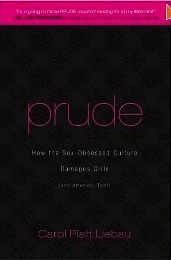 PRUDE:
PRUDE:
How the Sex-Obsessed Culture Damages Girls (and America, Too!)
by Carol Platt Liebau
Excerpt: “When a girl’s attention is directed primarily to her appearance, there’s less time for her to pursue other interests and develop other skills that can serve as sources of self-esteem. When she’s learned to garner male attention simply by displaying her body, it’s less likely that she’ll develop the other common qualities that are conducive to strong relationships and lasting happiness; indeed, a lifetime of focusing primarily on her own appearance in body — and automatically expecting men to do so as well — can make it difficult to form deep, lasting bonds with any man.”








February 2, 2013
HOPE for Hurting Marriages

I’m over at The Laundry Moms this weekend writing about HOPE for Hurting Marriages.
Marriages are under assault today like never before. Even rock-solid relationships are not immune to attack, whether those attacks come from without or within.
It is possible to safeguard our marriages and to protect our homes and families from the forces that would seek to destroy them. Want to know how?
Read the whole article and find out four things you can do today to fortify your marriage and keep it standing strong.








January 20, 2013
The Art of Leadership (and a Book Giveaway)
 Shortly before we married, my husband’s grandmother attempted to teach me how to tat.
Shortly before we married, my husband’s grandmother attempted to teach me how to tat.
For those unfamiliar with this dying art form, tatting is a very tedious, time-consuming method of handcrafting intricate lace using fine cotton thread wound about a two-inch shuttle. This shuttle is woven in and out and around the loose end of string until a delicate web of loops and knots begins to take shape.
At least, that is how it’s supposed to work. I never got the hang of it myself. Nanny refused to let me keep the shuttle in my hands long enough to figure it out. No sooner did I get the cotton threaded through my fingers than she would snatch it away.
“Not like that! Like this! Now watch!”
I was allowed three fleeting attempts before she announced that “some people just aren’t cut out for this sort of thing,” plucked the shuttle from my fingers, and locked it away in her secretary for good. So my first and only tatting lesson was a miserable failure.
It wasn’t because I lacked coordination—my fine motor skills were superb. It wasn’t because I hadn’t the patience for such intricate work—I’d been making fine lace for years using a crochet needle with a microscopic hook. It wasn’t because my mind couldn’t grasp the complicated stitches — I’d done needlework (with a pen in hand for taking notes) through all my college classes and still graduated summa cum laude with a degree in mathematics. It wasn’t because I lacked interest or time or aptitude or creativity or resolve.
No, the only reason I failed at tatting is because my husband’s spirited little grandma — bless her heart — couldn’t stand to watch me struggle. She insisted on showing me how to do it again and again and again, and in the process prevented my ever learning how to do it myself.
I wonder how many husbands feel in their marriages the way I felt on the couch next to Nanny that night?
How many men would love to lead their families — they’re capable, ready, and willing to do so — but their wives refuse to hand over the reins? How many are never given the opportunity to prove themselves, because their wives fear they’ll fail, or won’t do things the way the wife thinks they should be done? How many find the power struggle that ensues so enormously frustrating that they’re ready to give up even trying?
Few men enter marriage as experts in the management of a household. Whatever experience they get must be gained through on-the-job training.
Do your husband a favor and follow his lead. Be supportive of the decisions he makes instead of arguing for your own way or trying to second-guess him. Cheer him on enthusiastically, give him room to grow, and you will find that his skill for leadership — like any other artistic ability — will improve with practice.
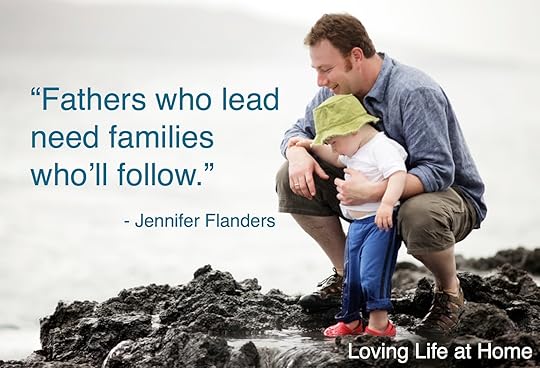
=============
The above post is adapted from my book, Love Your Husband/Love Yourself: Embracing God’s Purpose for Passion in Marriage . Haven’t read it yet? Then enter this giveaway for a chance to win a free copy.
. Haven’t read it yet? Then enter this giveaway for a chance to win a free copy.











